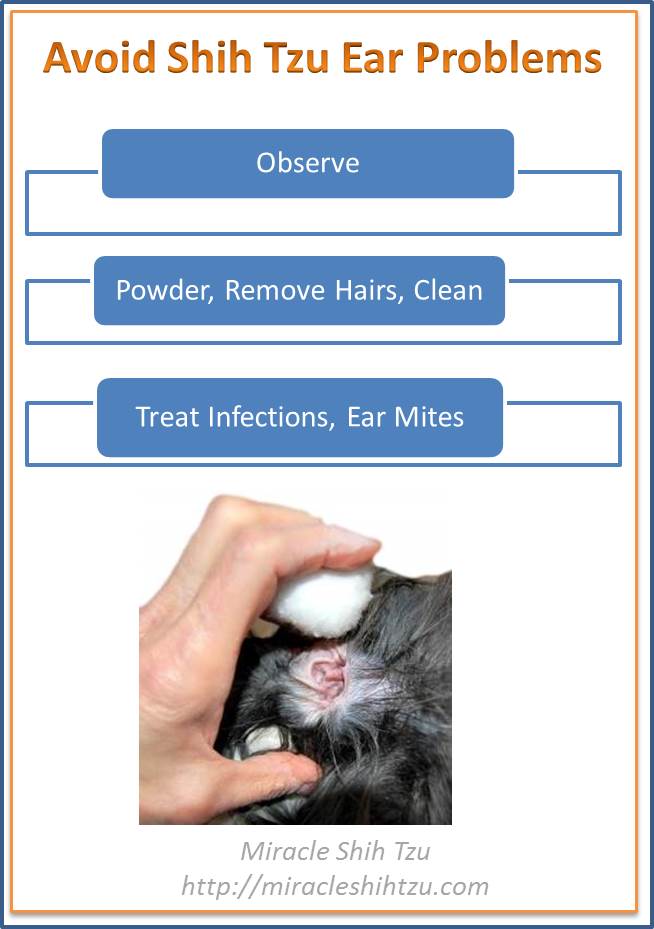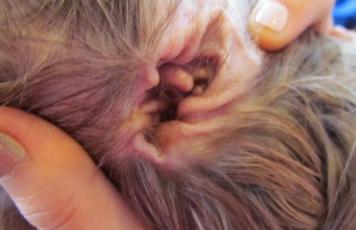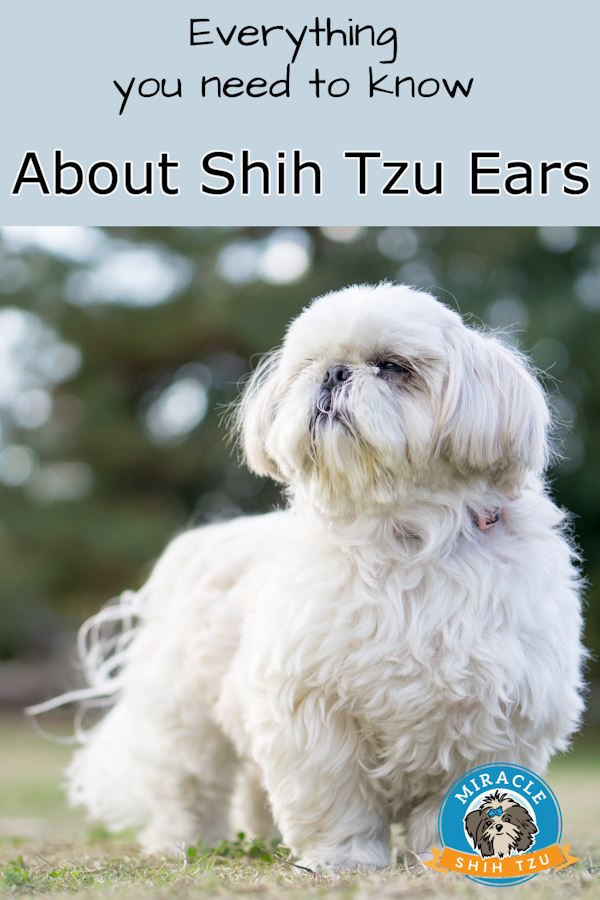About Shih Tzu Ears
About Shih Tzu Ears, By Janice Jones |Last Updated 02-14-2024
Are you worried about your Shih Tzu's ears? If your Tzu's ears are red, smelly, and dirty, or if your fur baby is scratching, it’s a good bet that a problem is festering.
Most Shih Tzu puppy owners don't even give ears a second thought unless they try to train their puppy and the puppy "pretends" not to hear. Luckily, this breed does not have significant genetic hearing issues, but hearing loss can occur in dogs with chronically untreated ear infections.
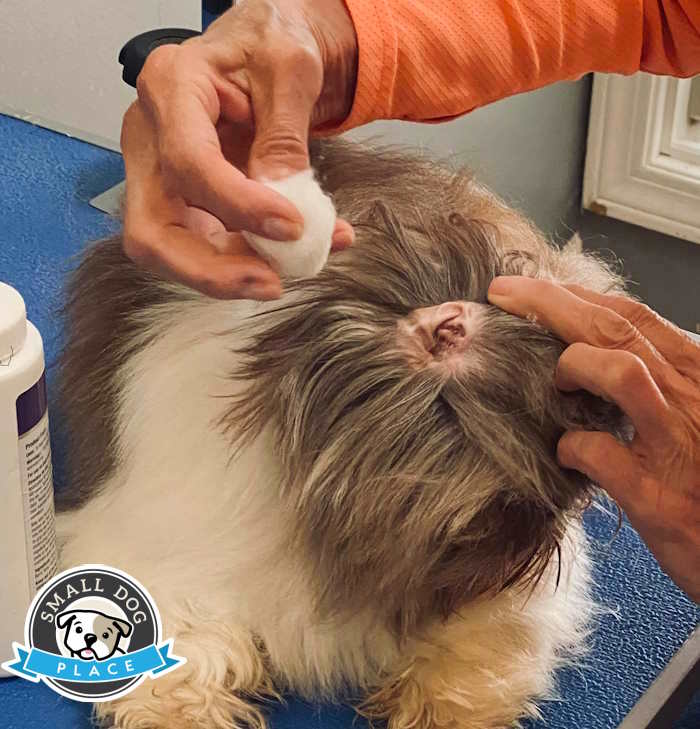
Why Do Shih Tzu Dogs Have Ear Problems?
There are some reasons that Shih Tzu dogs have ear problems:
- Shape of their ears
- Doggie ear canal anatomy
- Thick hair inside and outside of the ears
- Allergies and Parasites
Shape of Dog Ears
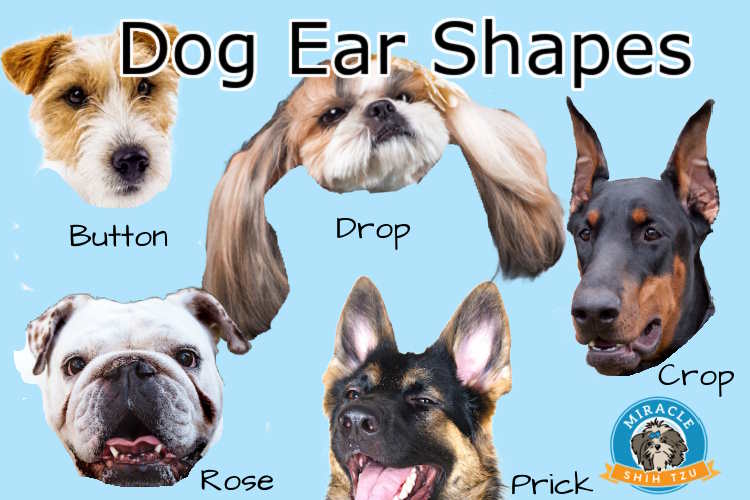
Dog ears vary widely in shape and size, primarily determined by their breed. There are essentially five main types of dog ear shapes.
- Prick or erect ears, common in breeds like the German Shepherd or Siberian Husky, are upright and pointed, with little to no bending.
- Button ears, found on breeds like the Jack Russell Terrier, fold forwards to the dog's head, partially covering the ear canal.
- Crop ears are surgically altered to stand erect, commonly seen in breeds such as Dobermans.
- Rose ears fold back to reveal the inner ear, common in breeds such as the Greyhound or Bulldog.
- Drop or pendant ears hang down from the side of the head, covering the ear canal, common in breeds like Basset Hounds or Shih Tzu.
Each ear type contributes not only to the dog's overall appearance but may also affect their susceptibility to certain ear conditions. The big difference between Shih Tzu ears and many other dog breeds is that their drop ears are also heavily coated with thick hair.
Ear Canal Anatomy
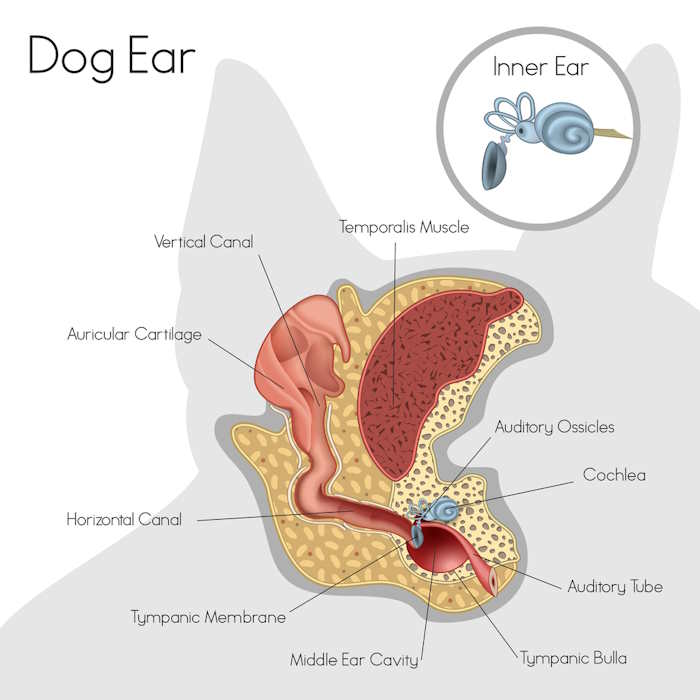 About Shih Tzu Ears: Ear Canal Anatomy
About Shih Tzu Ears: Ear Canal AnatomyRegardless of what type of ear flap a dog has, dog ear anatomy is similar. The ear canal of a dog is quite different from a human's. It is shaped more like an 'L', extending vertically down (the vertical canal) from the opening at the ear flap and then making a 90-degree horizontal turn (the horizontal canal) towards the eardrum.
This design makes a dog's ear more prone to collecting debris and moisture. The eardrum, or tympanic membrane, lies at the intersection of the vertical and horizontal canals and is extremely sensitive. This unique structure of a dog's ear canal is why you should never insert anything deep into the ear, as it could damage the eardrum and cause severe issues for your dog.
Both the type of ear flap and the anatomy work together to create an environment where debris or water can easily become trapped in Shih Tzu ears.
Both the anatomy of a Shih Tzu's ear canal and the way they carry their ears (drop ears) create an environment where any debris or water gets trapped, making it very difficult to remove on its own. To add to the problem, Shih Tzu dogs typically have very thick and heavy hair covering their ear flaps, with an abundance of hair growing inside the ear canal. When you think about Shih Tzu's ears, it's not hard to imagine how infections can quickly occur.
The typical ear canal in the Shih Tzu dog is clean, odor-free, and has the color of a light-skinned person.
Dog Ear Infections
Ear infections are one of the top reasons people take their dogs to the vet. You can recognize if your dog is having difficulty with his ear, as he will shake his head, scratch his ears, rub his head on the floor or other objects, and may cry out or groan when scratching.
While ear infections can be concerning, the infection itself may be the result of another problem, such as allergies or parasites.
Allergies May Be the Cause of Ear Infections
Shih Tzus are prone to several types of allergies that can contribute to ear infections.
- Food allergies, common in this breed, can cause ear inflammation and subsequent infections.
- Environmental allergies, also known as Atopy, include allergies to pollen, mold, dust mites, and other environmental allergens.
- Inhalation or contact with these allergens can lead to itching and inflammation, particularly around the dog's ears and paws.
- Some Shih Tzus are also allergic to flea saliva, which can cause severe itching and skin irritation that may affect the ears as well.
Frequent scratching due to allergies can damage the skin and make it susceptible to secondary infections from yeast or bacteria. It is essential to work with a vet to manage these allergies and reduce the risk of recurrent ear infections and possible hair loss. Determining the specific type of allergy causing the ear problems may not always be easy.
Parasites
I mentioned fleas and the flea saliva as a possible allergy, but other parasites may be involved as well, namely ear mites.
Ear mites are another potential problem. These tiny white parasites can live in
the ear canal, causing intense itching and head shaking in your dog. While they
may not be visible to the naked eye, your veterinarian can detect them using an
otoscope. Cleaning your dog's ears periodically can help prevent these nasty
problems. Most owners will notice increased and intense ear scratching, which
is a good indication that something is wrong with your Shih Tzu's ears.
Differences Between Allergies and Ear Mites
Both ear infections and ear mites can cause discomfort and changes to your dog's ears, but they have distinctive differences.
Allergies: Symptoms
- Redness
- Inflamation
- Discharge (yellow, brown, or bloody)
- Foul odor
- Sweeling
Ear Mites: Symptoms
Dogs with ear mites typically have
- Dark and dry debris inside the ear, resembling coffee grounds.
- The inner ear may appear red and inflamed
- Intense scratching and head shaking.
The good news is that ear problems in Shih Tzus can be prevented with a bit of help from you. Cleaning out your dog's ears may not be your ideal choice for evening fun, but by learning a few tricks to keep those ears clean, smelling fresh, and infection-free, you can save money and protect your Shih Tzu's well-being.
About Shih Tzu Ears: Sampling of My Shih Tzu Dogs With Varying Lengths of Dog Ears
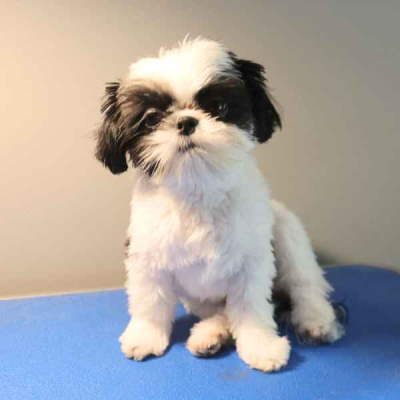
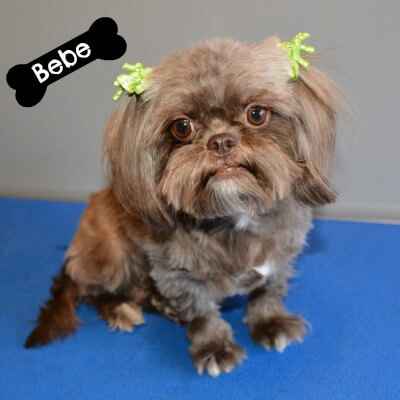


Treating Ear Problems
Several options are available for treating a dog's ear problems, depending on the type of issue. It's crucial to always consult with a veterinarian before administering any treatment to ensure it's appropriate for your dog's specific problem.
Over-the-counter ear drops and cleaners like Zymox or Virbac's Epi-Otic Advanced can be used to treat minor infections and keep the ears clean.
More severe infections may require prescription ear drops like Otomax or Mometamax.
For ear mites, treatments like Revolution or Advantage Multi can help eradicate the parasites.
Oral or injectable antibiotics may be necessary for severe bacterial infections that don't respond to topical treatments.
Working closely with your vet will ensure that you choose the right treatment option for your Shih Tzu.
Preventing Ear Problems
Preventing ear problems in Shih Tzu dogs is possible by incorporating three simple steps into your regular grooming routine:
- Observing for infection
- Wiping out excess wax and dirt
- Removing excessive hair inside the canal if necessary.
However, if your Shih Tzu swims frequently, has a history of ear infections, or is currently dealing with an ear infection, cleaning may need to be more frequent. Monitor your Shih Tzu's ears regularly for any signs of infection, such as redness, swelling, or unusual discharge.
Alternately, Opt for Your Professional Groomer to Take Care of Your Shih Tzu's Ears
If you usually take your dog to a professional groomer, they will likely clean out the ear canal and remove excessive hair as part of the overall service.
Regularly checking your dog's ears is essential, however as ear infections can occur between professional grooming appointments. Cleaning frequency can vary depending on the individual dog, but a good general rule for Shih Tzus, given their susceptibility to ear problems, is to clean their ears once a week.
D.I.Y. Procedure for Caring About Shih Tzu Ears: Cleaning the Ears
1. Assemble Materials You Will Need to Clean the Ears
You Will Need
- Clean cotton balls, tissues or gauze pads (at least one or more for each ear)
- Mineral oil, ear cleaner wipes, or ear cleaner.
- Ear Powder (if you will be removing hair)
- Curved Hemostats or tweezers (Optional for removing hair - You may decide to use your thumb and index finger to remove a few hairs at a time)
- Flashlight or scope. You can purchase a professional scope or buy one commonly used by parents for checking on their children's ears. These are available online as well as off in most retail pharmacies.
2. Observe for Infection
Before you begin to clean the ear, observe the interior of the ear. Look for redness, swelling, or the presence of little specs of what appear to be coarse black pepper (Ear mites). Smell the ear canal.
Does it have an odor? Any of these signs should alert you to a possible infection or ear mite infestation. Stop and call to make a veterinary appointment. If everything appears normal, proceed to clean the ear and remove any ear hairs
Contact your veterinarian if you notice any of the following symptoms affecting your Shih Tzu’s ears: These may be signs of mites or infections:
Note: Some veterinarians prefer to observe the ear before you do any cleaning.
- Ear discharge
- Bad smells
- Redness
- Swelling
- Crusty skin
- Hair loss
3. Clean Excessive Wax and Hair from your Shih Tzu Ears
Continue to read through the steps or if you prefer, here is a video I created several years ago that takes you through the process of cleaning your dog's ears.
First, Remove Hair From Shih Tzu Ears
You will want to remove the hair inside your Shih Tzu’s ear periodically to prevent ear infections. Ear wax, ear hairs, moisture from swimming or bathing, and any other debris creates a fertile ground for an infection to brew. Most ear infections are caused by yeast or bacteria and anything that gets trapped in the canal is likely to remain.
Some dogs do not mind at all and others will squirm and wiggle. Others (most) will protest. This procedure is uncomfortable but not painful. I like to compare it to plucking eyebrows, if you have ever done this.
- First, sprinkle a few drops of an ear powder into the ear and spread it around if necessary to coat the ear hairs. Alternately, place the powder on your thumb and indext finger. The easiest way is to grab a few hairs with your thumb and finger and gently pull out. Repeat until the ear canal is free of hair, adding additional powder as needed.
- Sometimes, it is impossible to get the hair with your fingers and that is where a pair of tweezers or hemostats comes in handy. I prefer curved hemostats as you can grab hold, clamp down onto the hair, and gently pull. Tweezers work the same way. Be very cautious as you do this, as it is very easy to catch a piece of skin between your tweezers or hemostats. Your beloved Shih Tzu may remember and not forgive you!
If your dog has recurring ear infections, your vet may recommend testing him for allergies and/or using an anti-fungal ear cleaner.
Next, use a High Quality Cleaner to Remove Debris and Was
Caring about Shih Tzu ears, means cleaning!! To clean an ear, use a cotton ball, or ear wipe and gently wipe out each ear using a different wipe or cotton ball for each ear. (I have also used makeup removal pads with good results also. For very dirty ears, you will need to use several until the wipes come out clean.
If using an ear cleaner, place the recommended number of drops in each ear and gently massage the base of the ear. Let your dog shake. This can be messy but shaking losens any debris and making it easier to clean the ear canal. Clean the ear as well as you can and then use one last clean, dry cotton ball to dry the ear. It is not recommended to use cotton tipped applicators or Q-tips as they can cause trauma to the ear canal.
Frequently Asked Questions About Shih Tzu Ears
Do Shih Tzu Dogs Have Problems with their Ears?
Do Shih Tzu Dogs Have Problems with their Ears?
Unfortunately, the answer is yes. Even Shih Tzu bred by reputable breeders have issues due to the shape of the ear canal, the type of ear flap, and their tendency to suffer from allergies. The good news is that certain preventative measures can help.
Can You Use Hydrogen Peroxide to Clean Shih Tzu Ears?
Can You Use Hydrogen Peroxide to Clean Shih Tzu Ears?
No, it is not recommended. Hydrogen Peroxide, a common household item can cause iritation to the skin inside the ear, especially if used frequently over time. A better choice is a good, commercially available cleaner to keep the inside of the ear clean.
Should the ear hair inside of a Shih Tzu ear be pulled out.
Should the ear hair inside of a Shih Tzu ear be pulled out.
In recent years, this has become controversial. Those that advocate for removing hair state that poor air circulation, excess moisture build-up, thick hair and excessive ear wax are implicated as culprits for ear infections. Removing hair helps reduce these conditions and reduces the risk of infection. Alternately, some suggest that yanking out hair can cause small skin tears making it easier for bacteria to move in. Yanking out hair is never recommended, rather removing a few hairs at a time is all that is needed to open the ear canal and allow for air flow.
Conclusion and Last Words About Shih Tzu Ears
In conclusion, understanding and taking care of your Shih Tzu's ears is crucial for their overall health and well-being. Shih Tzus, with their lovely drop ears, are prone to ear issues like infections and mites, often linked to allergies.
Regular cleaning, inspection, and prompt attention to any signs of discomfort are key to preventing these problems. A clean, well-cared-for ear not only makes your Shih Tzu more comfortable but also helps preserve their hearing.
Making ear care a regular part of your pet's grooming routine, consulting your veterinarian, and staying proactive will ensure the best ear health for your beloved Shih Tzu.
About Shih Tzu Ears: Ear Wax Build Up in the Ear Canal
A site visitor recently emailed me about a problem she was having with her Shih Tzu...
I own a six year old Shih Tzu, had him since he was 8 weeks old, and he has had an ongoing issue with his right ear generating an over-abundance of ear wax. I have taken him to the vet, and it is not an infection, rather wax buildup. I have had him on good food, grain free, for over 4 years, I do not let him have any corn in his treats, etc. and do not feel him table scraps or human food other than the occasional piece of meat, etc.
My groomer has suggested a product called Micro-tek, made by Eqyss, a spray, that can be used to flush out and clean their ears, which I have been using about once a week, but last night discovered a large ball of wax protruding from his ear. I didn't know until watching your video that you can pull out their ear hair so easily, so maybe I need to begin doing that once a week or so. Do you have any solutions or experience with a dog producing so much ear wax?
And, My response...
Any dog that has drop down ears can be prone to ear problems, but it sounds like you are doing all the right things when it comes to diet and cleaning. Some dogs just seem to produce more ear wax than others and I suspect the reason has a genetic component. I've always used cleaning solutions prescribed by my vet so I'm not 100% comfortable recommending one product over another.
I do know that you should pick one that has a drying component to help with the ear wax. Also, how often do you bathe your dog? Sometimes we can "over-bathe" them. Frequent bathing especially when water gets into the ear can cause problems.
When you do bathe your dog, think about Shih Tzu ears and place a small piece of cotton inside the ear so no water can enter. Removing all the hair inside the ear will also help because a clean ear canal will allow air to circulate easier and prevent infection from setting in.
When you remove the little hairs, use an ear powder first to help you grab and remove them easily. Then, use your ear cleaning solution to thoroughly clean out the ear. Most dogs will shake their head when you put the solution into their ear, but that is OK because it helps remove some of the debris. Hope this helps. Let me know if you have any other questions.
"Hi, I'm Janice Jones, a former veterinary technician and Shih Tzu expert with over 40 years of experience with the breed. Through Miracle Shih Tzu, I combine my medical background and extensive breed knowledge to provide reliable, practical advice for Shih Tzu owners. My mission is to help you give your Shih Tzu the happiest, healthiest life possible through evidence-based information and real-world solutions. Whether you're new to the breed or a seasoned owner, you'll find trusted guidance here for all aspects of Shih Tzu care.
I hold an undergraduate degree in Psychology with a minor in biology, Early Childhood Education, and Nursing, and a Master's in Mental Health Counseling.
